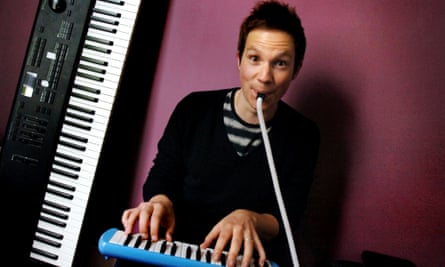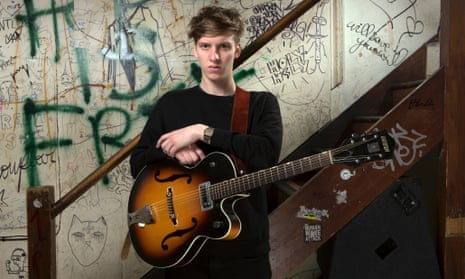Shortly before Christmas, the busker delivering a slapdash performance of George Ezra’s Budapest in a London shopping centre might have noticed someone filming it on his phone. What the busker won’t have known was that the man, Joel Pott, was the song’s co-writer. But then neither would most of the 865,000 who’ve bought Budapest in the UK, or those who’ve helped it reach 100m Spotify streams. Or, indeed, the industry types who’ve nominated Budapest for Best British Single at this year’s Brits. Pott didn’t mind, though. He went home and showed his wife the video. “She said I should’ve told him the bits he was getting wrong,” he grins.
In fact, the credits for Ezra’s chart-topping Wanted On Voyage album show that Pott co-wrote all but three of its tracks with Ezra. His name is also among the writers for London Grammar’s If You Wait album. And on songs by 2015 contenders James Bay and Shura.
But if Pott’s name rings a bell, it’s probably as the frontman of mid-noughties band Athlete, who enjoyed two platinum albums and a big single called Wires. But Athlete’s moment in the sun was a fleeting one, and rather than trudging on with diminishing returns, they eventually put the band on hold to try other things. For Pott – who won an Ivor Novello songwriting award for Wires – that meant finally agreeing to work with other artists.
“I think there’s an English approach of, ‘I’m an artist. I don’t ever collaborate,’” he says. “I definitely had to get to a point where I was comfortable with the idea.”
He’s not the only one. In 2002, after Matt Hales’s Aqualung had a hit with Strange And Beautiful, offers for Hales to write with other artists began rolling in. “I thought that would be shameful,” he says now. “Like turning my back on being a real artist. I thought it was the most mercenary, hackish aspect of the business.”

But although Aqualung’s success continued, the touring lifestyle took its toll. “I was away all the time,” Hales says. “My little boy was shying away from me when I came in the front door. It was heart-breaking; like, my reward for making my career work is that I’m going to be estranged from my family?” Reluctantly, Hales decided to try songwriting for others.
Among the first acts he worked with was an unknown singer called Lianne La Havas. “I was thinking, am I creepy now? There’s a young woman coming to my studio, probably thinking, ‘Oh God! I’ve got to see some terrible old man to write a hit.’”
Instead, the pair clicked and Hales had an epiphany. “I realised I could make music I’d always wanted to make but couldn’t because I’d be the one who’d have to sing it. It was like, ‘Wow, if you collaborate you get to have this much deeper musical life.’” Hales went on to co-write – and produce – most of La Havas’s Mercury-nominated album, Is Your Love Big Enough?, and now counts Paloma Faith, the Fray and Jason Mraz among his credits.
That musical flexibility afforded to songwriters is also cherished by Jamie Scott, whose 2006 album with the Polydor-signed Jamie Scott & the Town you probably don’t remember. But you may well know the songs Scott has subsequently co-written for artists as diverse as Michael Kiwanuka, Enrique Iglesias and One Direction, for whom Scott’s hits include Story of My Life.
“I don’t just want to sit down and write folk acoustic records for myself,” he says. “As a songwriter, you can be much more eclectic.”
But as a songwriter you’re also much less celebrated than the artists performing the songs you’ve helped create. Which, if you’re used to the attention that comes with being a frontman, does involve some adjustment.
“You have to be the right kind of character,” agrees Pott. “I think if you have such a massive ego that you need to force yourself to the front, you’re going to struggle.”
It is, Pott says, a different kind of satisfaction seeing George Ezra’s album flying high compared with the success he had with Athlete. For a decade, Athlete was his life. When Pott worked on Wanted On Voyage he thought of himself as being a fully committed member of a band called George Ezra. But that was only ever for the duration of the sessions. “Then I moved on to something else. That album is 100% George’s thing. He’s the one performing those songs every night. So I don’t think it holds quite the same weight for me.” He pauses for a moment. “But it’s still bloody great! And I definitely don’t miss the promo.”
Ah, yes. One of the great boons for the artist-turned-songwriter is no longer having to endure the promotional grind.
“I get the purest experience from this vantage point,” Hales says. “I make something I’m really excited about with an artist I really like and then say, ‘See ya!’. And they go off for three years slogging around the world doing radio interviews with fools and dealing with people being weird to them in Tesco’s.”
Of course, songwriters can also make a very decent living, if their songs are successful. But that’s certainly not a given. Still only 28, Irish singer-songwriter Ruth-Anne Cunningham (who performs as Rooty) has spent a decade writing songs for artists including Britney Spears, Pixie Lott and One Direction. But she estimates that under 10% of her thousand songs have been released. “You need an amazing thick skin for rejection,” she says. All the more so when you discover that songwriters don’t earn anything for initially writing a track. The money only comes when songs are purchased and played.
When that happens, the rewards can be substantial, as Cunningham discovered when a song she co-wrote aged 17, Too Little Too Late, became a million-seller for US singer JoJo. “You don’t see money from songs until at least a year later. But it can be life-changing,” she says. “Although I think I speak for a lot of songwriters in saying you can be incredibly rich at points, but you can also be like, ‘Damn, the cheques are getting really low’. You’ve got be in this for the love of making music.”
That’s something all the songwriters I speak to are vehement about: their job involves trying to write great songs, not trying to write hits. “In my head, it shouldn’t ever feel like work,” says Pott. That said, the role does involve talent-spotting. When your reputation and income are tied to an artist’s success, you’ll naturally work with acts you see potential in. “But then you never really know what will take off,” Scott says.
When songwriters do agree to a writing session, the first meeting with an artist sounds essentially like a blind date. “Yes, fundamentally awkward,” Hales says. “But it’s also like a blind date where you’re kind of expected to fuck. Everyone’s hoping you will. Emailing you saying, ‘Have you put it in yet?’”
Oddly enough, a large part of being a successful co-writer seems to involve being a likable person. “That’s fundamentally one of the most important things,” agrees Scott. “You have to get to know someone well enough that they can say anything and not feel stupid. And normally you have to do that in about two hours.”
The fact Scott that has worked with One Direction since their very first songwriting session is, he says, a major factor in the enormous success they’ve had together over the band’s four albums. “I feel like I can say whatever I want to the boys and they’re not going to take offence. That’s invaluable.”
So the artists really do contribute to the process? “Absolutely,” Cunningham says. “I won’t have anybody in a room that isn’t contributing to the song. Anyone can say anything that can shift a song’s direction. Even the people who don’t really come up with ideas but know when something is right are important. It’s like playing football – someone scores the goal, but there’s a whole team setting it up.”
And when the ball hits the net? “It’s the highest high you can ever feel,” Cunningham says. “You’ve created something that you love from nothing.”
“It’s always a bit weird,” Hales says. “Something will come up in conversation and then you’ll womble over to the studio and a few hours later there’s quite often a brand new blinking little baby song. But the blind date thing is a good analogy. Because, of course, sometimes on a blind date by the end of the evening you have fallen in love and your life has changed for ever. It’s just odd to do a job where than can happen twice a week.”

Comments (…)
Sign in or create your Guardian account to join the discussion